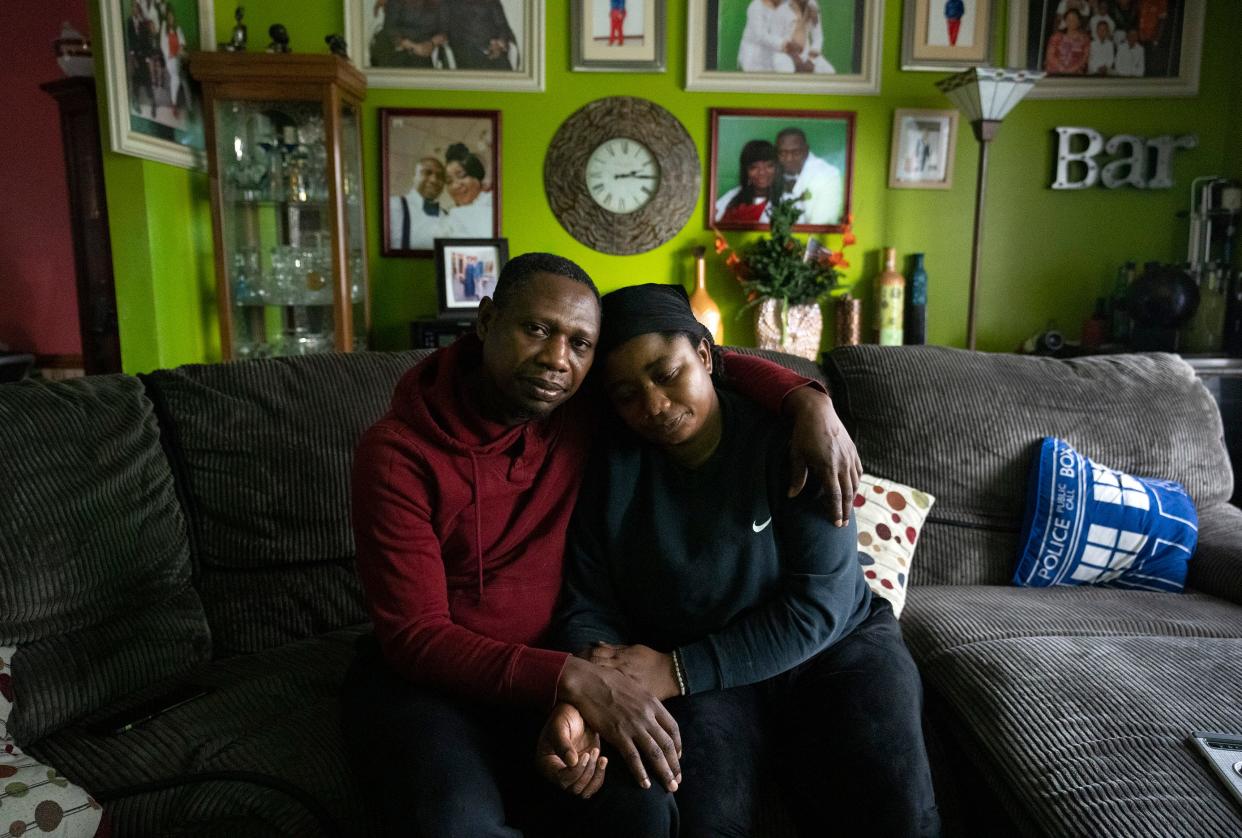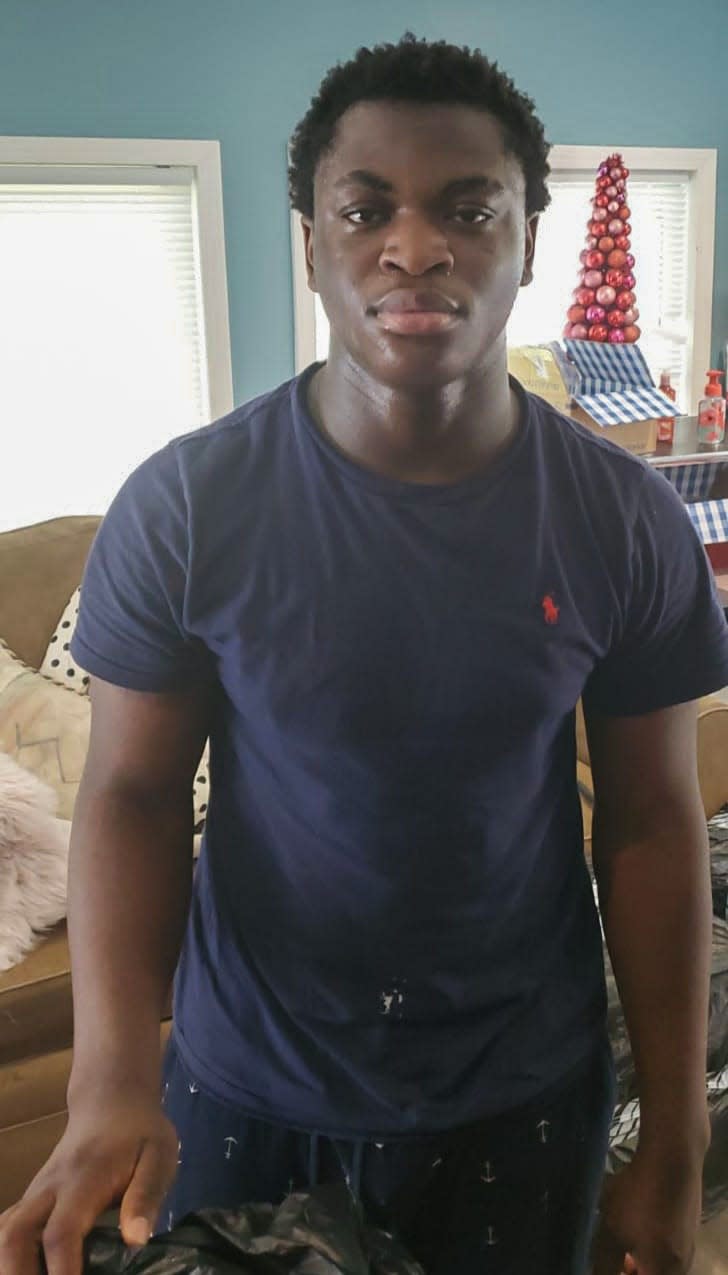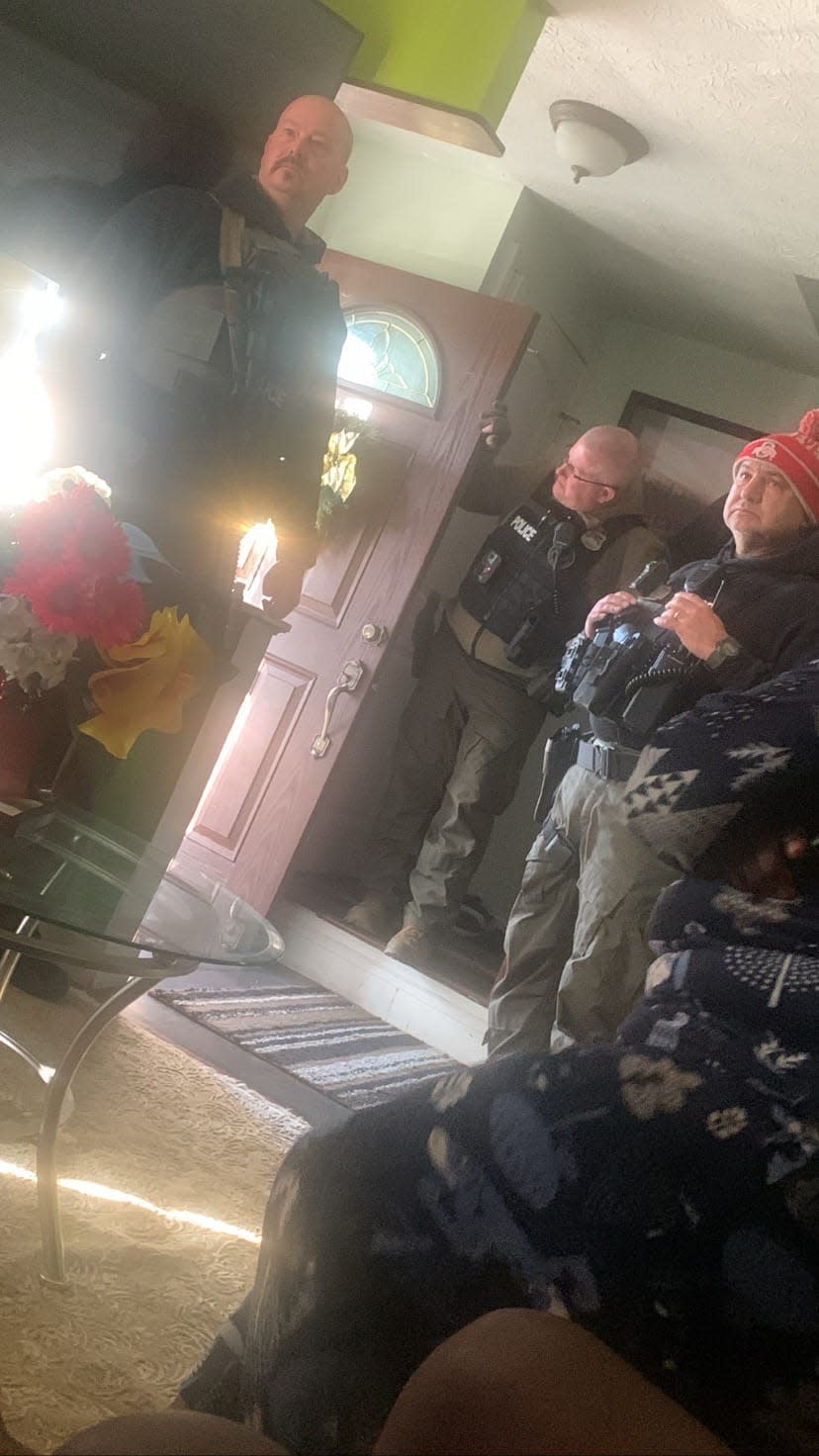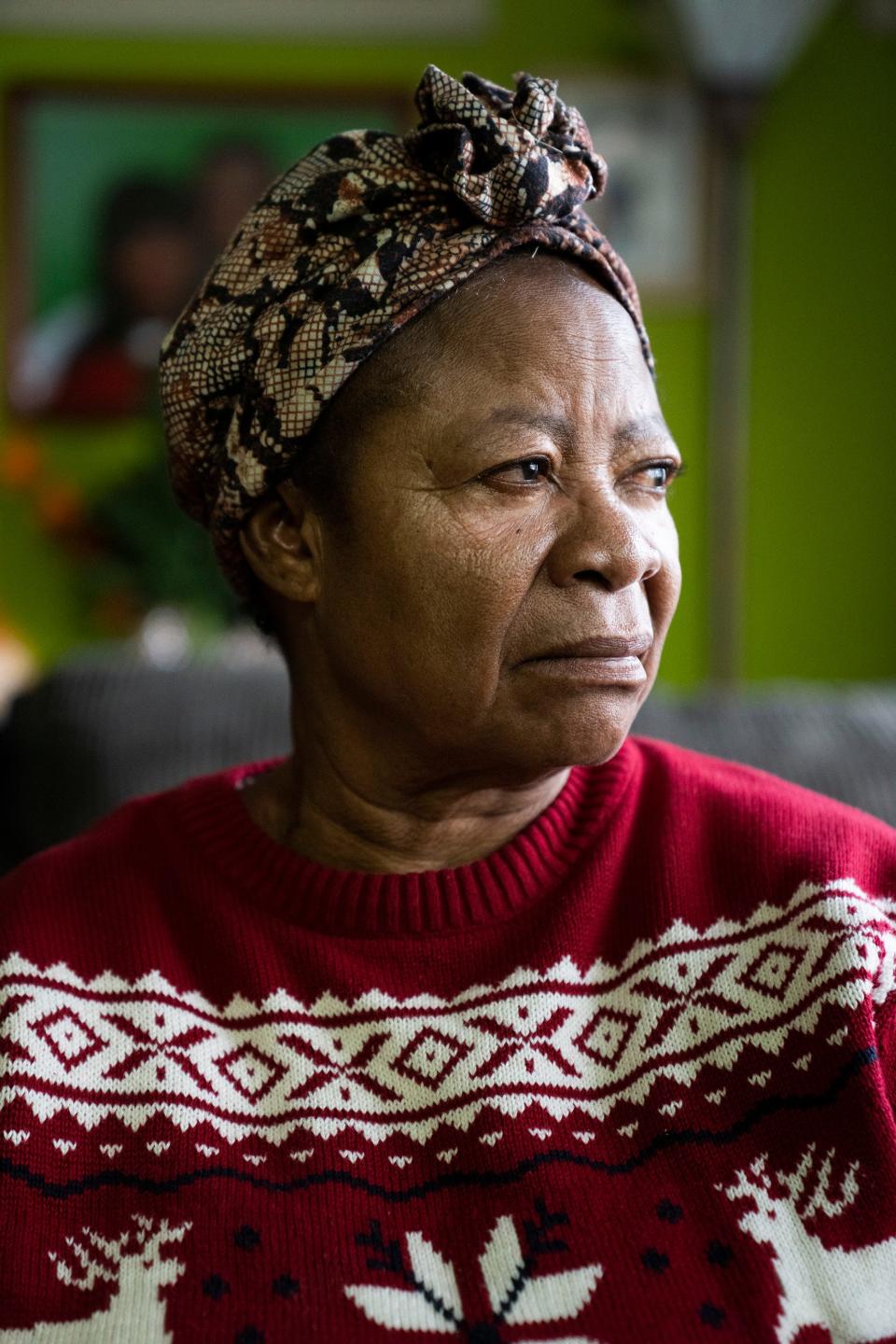Dispatch investigation raises questions about Columbus police SWAT use on teen

As Westerville North High School students celebrated the end of the school year last month, the class of rising seniors was missing a member.
Kofi Ofosuhene Debrah was, by many accounts, a good student, employee and brother. His school principal described him as a talented artist and “a tremendous person.” A teacher said he had donated money for Ukraine and, separately, to a friend fighting a brain tumor. A supervisor at his after-school job at a retirement home described him as “like a grandson.”
Kofi was born in Ghana but moved to the U.S. at age 5 with his parents. At 17, he often looked after his four younger siblings while his parents worked long hours.
But a series of events late last year culminated in tragedy.
Police determined that Kofi was a person of interest in a crime involving nude photographs taken by some schoolmates and shared on Snapchat, the online messaging app. According to family members, around 10 officers armed with assault rifles and other guns conducted a raid on his Northeast Side house on Nov. 23. Less than 26 hours later, he had died by suicide.
The loss left behind a hole in the household.
“Kofi was my angel. He was my advocate … my everything,” said his mother Henrietta Debrah, 40, sitting in her living room beside a wall of family photos, many containing her son. “I can't sleep because when I’m lying down, I’m looking at these pictures, thinking, why, why, why?”
The strength of the connections between the crime, the SWAT raid — during which Kofi was handcuffed and detained without his parents, but not arrested — and the suicide are difficult to determine. But community leaders said the case raises important questions around how police interact with minors, especially Black teens and those from immigrant backgrounds, as well as the militarization of police.
Ibrahima Sow, chair of Ohio’s New African Immigrants Commission, said that the use of a SWAT team in this case was unjustified given the allegations.
“They were using force ... and not really protecting and protecting and serving," Sow said. " … Looking at this Black family and this Black man, as young as he was, as a threat that needed a whole SWAT team to control. It’s .. inexcusable, and it's unfortunate."
Henrietta and Kofi’s father, Frank Debrah, 52, believe their son was innocent of wrongdoing, and say that in any case, the use of a SWAT team was disproportionate to the alleged crime.
“I know Kofi, and he wouldn’t (commit suicide) — not unless someone pushed him to,” said Frank Debrah, 52, Kofi’s father who added that his son's death was totally unexpected and they had no warning signs.
Mental health experts told The Dispatch that reasons for suicide can be complex and any person talking about suicide should be taken seriously. They emphasized that help is out there for those thinking about taking their own life.
The Columbus Division of Police declined The Dispatch’s request for an interview with the detective in charge of the case or anyone else from the division, and refused to release footage from a police cruiser where Kofi was detained during the raid, citing an “open investigation … involving both a juvenile person of interest and juvenile victims.”
Most juvenile records are sealed, but Kofi's parents said he had no criminal record.
Asked why police decided to deploy the SWAT team for Kofi, division spokesperson Melanie Amato said in an email only that “SWAT officers are used to serve a warrant when it is a 'high risk' situation.”

A person of interest, a raid and a suicide
According to family members, officers pounded on the Debrahs’ front door sometime between 9 a.m. and 10 a.m. on Nov. 23, a Wednesday. Westerville city schools were on Thanksgiving vacation, so Kofi and his siblings were at home; Kofi let the police in.
According to a search warrant that the police would later leave at the house, Kofi was a person of interest in a child pornography case. Possession of sexually explicit content depicting a minor is illegal, even if the possessor is another minor.
The detective in charge later would tell the parents the case was filed by two girls in Kofi’s school district who had shared nude images of themselves on Snapchat, which they said someone was using to “extort” them. In a conversation that the parents recorded and shared with The Dispatch, the detective said he was led to their son based on a phone linked to their address and a physical description that resembled Kofi; he did not have enough evidence against Kofi to consider him a “suspect.”
Henrietta said she was awakened by the pounding on the door; she had just fallen asleep after working the night shift as a patient care associate at a local hospital. Kofi’s father was at his job at a warehouse.
By the time Henrietta came downstairs, the police had already searched the basement. She said police initially pointed guns at her and some of the children. Kofi, his four siblings, and three children of family friends were at home at the time.
Henrietta said officers detained her in the living room with the children and her own mother, Dora Afrane, who lives with them, for between one and two hours while they searched the entire house. Officers left behind a mess of overturned trash cans and emptied closets that Henrietta videotaped on her phone.
Around half an hour into the raid, according to Henrietta, police took Kofi outside to a cruiser wearing handcuffs and no shoes. He made no attempt to resist, his family said.
Police held Kofi in their vehicle for around 25 minutes before letting him go, according to his mother. An inventory of the search warrant indicates officers in the car took a cheek swab to obtain his DNA. They also took an “Apple iMac,” a “black Apple phone,” a “white Apple phone” and a “Chromebook power chord” from the house.
Amato, the police spokesperson, said that officers did not question or interrogate Kofi in the car. Rather, she said, “He was placed in the back of the cruiser while SWAT served a search warrant for that location … due to the fact he was a person of interest, but no questions were asked.”
But Frank said his son told him that he talked with officers while in the squad car.
Henrietta said that after Kofi was released, she heard officers tell Kofi, “‘You know what you did. You can go to jail.'"
In a conversation that night with his parents, Kofi admitted to having received nude photographs of girls at his school, but said he had done nothing else with them. He said some friends had taken his phone away from him soon after he received the images but he was too embarrassed about losing the phone to tell his parents at the time. The phones the police seized during the raid were other phones that belonged to the family.
Months later, the detective in charge of the case, Jack Addington, would tell the parents that Kofi had no known connection with the girls in the photographs “except they go to the same school system,” according to an audio recording the parents made of the conversation.
The morning after the raid, on Thanksgiving, Kofi’s family discovered he was missing and began searching frantically for him in their neighborhood. Around noon, a passerby found Kofi’s body about two miles away in a creek and reported it to police.
The family said they learned about the death the following day from the Franklin County Coroner’s Office, which would eventually rule the death a suicide. Kofi left behind a two-page handwritten note saying goodbye to his parents and siblings, but he gave no clear explanation of his decision.

Pushing a minor over the edge?
Ohio’s child pornography laws apply to minors equally as adults, even as “sexting” — sharing explicit content of oneself using chat apps — becomes more commonplace between teens.
Some advocates have pushed for redefining punishments for child pornography to account for this trend — as some states have done — but others point to the dangers of teenage sexting. In one high-profile case in 2009, a Cincinnati teenager died by suicide after her ex-boyfriend shared her sexting messages without her consent.
Today, at a judge’s discretion, a minor offender in Ohio can theoretically be sent to the Department of Youth Services until age 21, face prison time as an adult, and be required to register as a sex offender for life, according to Jonathan Tyack, a Columbus defense attorney who specializes in teen sexting cases.
But in practice, that rarely happens.
“Usually, there's some education involved (and) some kind of assessment … to make sure that the child doesn't have some real psychological problem or some bigger issue that needs to be addressed. But after that, my experience is usually the cases are dismissed,” Tyack told The Dispatch.
Nonetheless, he said, “I can see a scenario happening where a kid gets caught for this … and he gets the impression that he's facing these unbelievably draconian consequences and may overreact.”
Cynthia Engmann, a community leader and president of Ghana Council Ohio, called the use of a SWAT team unwarranted.
“We think the police went too far,” she said. “One would ask, would the reaction be the same if Kofi was a white boy?”
Keith Taylor, a professor at the John Jay College of Criminal Justice, said he would be interested in understanding more of the details from police about why they chose to use a SWAT team.
“From the outside looking in, it's hard to understand exactly what was involved in their decision-making process in terms of tactics,” said Taylor, who served as assistant commissioner in the New York Corrections Department and also was a detective sergeant in the New York Police Department, where he supervised SWAT teams.
“It’s interesting that, (if) this individual didn’t really represent any kind of physical threat, that it was necessary to have that kind of a response, particularly if they could have just had detectives or uniformed officers respond,” Taylor said.
Amato, the police spokesperson, declined to go into detail about the reasoning for using a SWAT team in Kofi's case, and said the division does not track how often it uses its SWAT team on minors. Columbus has a full-time SWAT team that serves approximately 100 warrants each year, according to its website.

'I don't know what to do'
Kofi’s stepsister Tracy, 17, described him as a “playful” person.
“He never seemed like he took everything seriously. I don’t know how to explain it, but he seemed happy,” she said.
Kofi played football and attended a Presbyterian church regularly with his family.
Both Westerville North High School principal Kurt Yancey and teacher Emily Mancini described the teen as beloved and quick to help those in need.
“At first he was quiet and shy in the classroom setting, but once he found out you had something in common or cared about a cause that he did, then he was very engaging in getting to know you,” Mancini said.
After the SWAT raid, Kofi’s family said his demeanor changed suddenly. That afternoon, Tracy and Kofi went together to their jobs in the dining hall of a nearby retirement home.
“At work, usually when I go up to him, he gives me a smile or something. (That day) he just went back to work,” Tracy said.
That evening, Kofi muttered things to himself like, “I don’t know what to do,” according to family members.
Mental health professionals told The Dispatch that sudden changes in someone’s behavior or demeanor can be an important warning sign.
“If someone makes statements like ‘I have given up,’ you have to take them for real,” said Rachelle Martin, executive director of the National Alliance on Mental Illness’ Franklin County chapter.
She also said the SWAT raid could have contributed to Kofi's distress.
Barbara Warren, a clinical professor at Ohio State University’s College of Nursing, said that adolescents are prone to impulsive behavior because their brains are not yet fully formed. She described a sharp increase in teen anxiety and depression, especially since COVID-19 hit, and said there are special challenges for teens who are Black, indigenous or people of color.
“Individuals from BIPOC populations are always quite concerned about what their parents think and feel about them and others, and they just don't always see the way out,” Warren said.

An accusation of rape
There was something else about his interaction with the police that Kofi did not reveal to his parents — but which he did mention to his siblings.
“There’s also a rape that fit your description, so we’re going to add you as a suspect,” Kofi’s brother Jerome, 15, said in recalling what Kofi said the police told him.
“He was more scared about the rape thing because he was like, they didn’t tell me where that came from or why they said it,” Tracy said.
Kofi’s mother, Henrietta, said officers did not tell her about the rape accusation, although she said that by the end of the raid, she was so upset with the police that she no longer wanted to hear what they had to say.
The police left behind a copy of the search warrant, which cited the child pornography law, but it made no mention of a rape allegation.
Addington also left behind a calling card. Frank, Kofi’s father, said he called Addington’s number multiple times after Kofi went missing but could not reach the detective.
The details of the rape allegation became more clear only months later, in April, when Frank and Henrietta finally secured an interview with Addington at police headquarters in downtown Columbus.
“There was some resemblance of Kofi as being the suspect around the house of a rape” that occurred in the neighborhood, Addington told the parents, according to the recording the parents made.
He said that a police analyst had made the connection based on a photo of Kofi, and that was why Addington took a cheek swab to collect the teen’s DNA during the raid. However, he said, “the DNA did not match up to the house of the rape.”
Such a rape allegation only raises the stakes regarding how police interact with minors when their parents are not present.
Under Ohio and federal law, judges can use their discretion to admit evidence in court that was obtained from minors without their parents present. All police are required to read a person their Miranda rights before an interrogation, and Columbus police directives require officers to consult parents prior to questioning a minor “when the juvenile’s custodial status and/or waiver of rights are in question.”
Amato, the police spokesperson, said that in Kofi’s case, “All policies were followed since we did not do an interview.”
However, Kofi’s family dispute that, saying that police discussed a rape case with Kofi without informing them about it.
“If a kid was of interest to you or your investigation, at least you have to come see the parents and tell them something,” said Eddy Ansah, Kofi’s maternal uncle who lives in Canal Winchester. “Give them a report — why were you here? What were you looking for? What did the kid do?”
Asked why the police did not inform the parents about the rape allegation, Amato declined to comment, citing the open investigation.
Officers interrogating a minor are allowed to lie or exaggerate their evidence in order to elicit a response, according to Robert Barnhart, a law professor at Capital University. Judges can choose whether to admit such evidence in court based on “the totality of the circumstances.”
While it is unclear if officers used deception in this case, Barnhart said that in general, it can be problematic when deployed against teens.
“From a policy perspective, given the susceptibility of minors, I don't think that police should be able to lie to them or interrogate them without at least notifying their parents,” he said.
A setback for a new American community
Engmann, the community leader, said that Kofi’s case has been a setback for the Ghanaian community in Columbus, which numbers in the thousands.
“Inasmuch as we are putting a lot of effort to integrate into the American system here in Columbus, some of these reactions from the police are pushing us back. It really puts fear in us,” she said.
Sow, from the New African Immigrants Commission, said he believes the police have not done enough to build a relationship with new Americans. He pointed to the case of a Somali woman who was killed in a hit-and-run by a drunk driver in 2022. An off-duty Columbus police officer was eventually indicted in the case, but only after nearly one year.
“Officers (who live in the) suburbs are supposed to be … protecting and serving these communities (in the city of Columbus) that otherwise they don't reflect at all. (But) they can't have real empathy because they are not a reflection of the community,” he said.
Kofi’s parents said that the members of the SWAT team who raided their home all appeared to be white. When asked about the racial makeup of the SWAT team, Amato, the police spokesperson, declined to comment.
Although the city of Columbus is only about half white, police data indicate that around 87% of the division is white, 10% is Black, 1% is Asian, and 2% is Hispanic or other races.
Amato said the division does not track how many officers have immigrant backgrounds, but said they make efforts to recruit officers from immigrant communities through public events and by translating recruitment literature into five languages.
None of that appears to have helped the Debrah family in this case.
On a recent early summer day, as neighborhood kids played basketball outside, Frank Debrah sat in his basement and spoke as he wiped away tears.
“Sometimes, I think I should leave this country,” he said.
He had recently returned from a trip back to Ghana, where he struggled to explain the circumstances of his eldest son’s death to relatives.
“Kofi was a wonderful boy,” Henrietta said. “A wonderful boy.”
If you or someone you know is experiencing a behavioral health crisis, you can reach Ohio's 24/7 Crisis Text Line by texting 4HOPE to 741741 or call the Franklin County Suicide Prevention Hotline at 614-221-5445 or the Teen Suicide Prevention Hotline at 614.722.1800. The national Suicide Prevention Lifeline can be reached by dialing 988 or by dialing 1-800-273-8255/TALK (1-888-628-9454 for Spanish speakers).
Peter Gill covers immigration, new American communities and religion for The Dispatch in partnership with Report for America. You can support work like his with a tax-deductible donation to Report for America at: bit.ly/3fNsGaZ.
pgill@dispatch.com
This article originally appeared on The Columbus Dispatch: Family seeks answers after son's suicide following police SWAT raid

